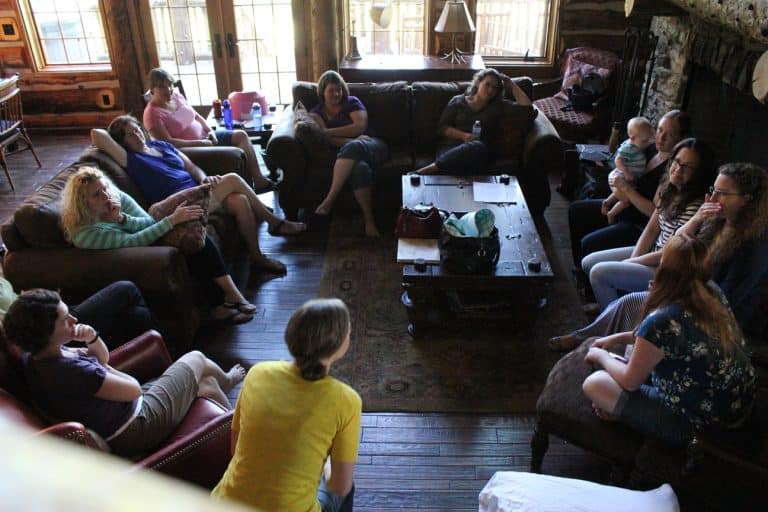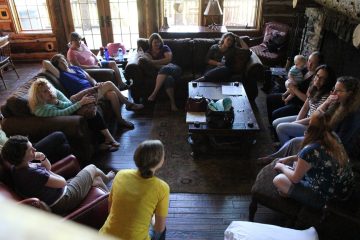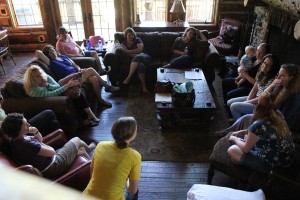Just over a year ago, I sat in a cabin with some of my dearest friends. They were women that I had gotten to know over the years when we had all lived near each other, but most of us had since moved away to different locations. We had kept in touch via email – we had actually spent most of a year discussing various issues in Mormonism (particularly women’s issues), and we had enjoyed such a rich conversation that we decided to meet up for a weekend retreat. We left 47 of our 50 combined children at home, packed our favorite treats and games, and met up in the mountains – away from the routine demands of life. After a day of playing games, gorging on cupcakes, and catching up, we broke into small groups.
And we started to tell our stories.
As a background, I had heard about the Mormon Women’s Oral History Project through a podcast I had listened to – Caroline Kline and Claudia Bushman spoke with Dan Wotherspoon about their book “Mormon Women Have Their Say” (reviewed here by Rachel), and they talked about the project. As my friend Melissa Mason and I planned our informal friends’ retreat, we talked about it and thought that we could use the Oral History Project as the central activity of the weekend – we thought it would be neat to hear everybody talk about their lives and hear some more background. So we got some basic information from Claudia, included some USB recording sticks in our packing gear, and sat down to listen to one another.
I went into that weekend in the heat of a faith crisis – how could I belong to a church where I felt undervalued because of my gender? How could I reconcile the dissonance I felt between my strong testimony that God loves women no differently from how God loves men, and the patriarchal structure of the institution? How do I make sense of the beauty of the temple, combined with the betrayal I felt there? There was a lot of pain in my heart – I couldn’t figure out how to be the Mormon woman I wanted to be: faithful, but living with authenticity and integrity.
As I listened to my friends tell their stories, I saw so many paths illustrated before me. Those who I would’ve thought to be straight-arrow, down-the-middle Mormon women were much more nuanced than I had expected. Those who I had perceived as being more radical actually had core testimonies that were stronger than steel. We expressed our triumphs, our heartbreaks, our questions, and our answers. The beautiful diversity of Mormon experience was illustrated before me – in these stories, I could see so many ways to be the Mormon woman I wanted to be. There was room for me to have a testimony and questions – to not have all of the answers right away, but not to be broken or stifled by not knowing, either. After a day of listening to each other, and telling my own story, I felt healed and transformed. It was one of the most sacred and empowering experiences of my life.
Fast forward one year, I feel incredibly privileged to be the co-director of one of the most important projects in Mormonism today. The Mormon Women’s Oral History Project is essential. We curate a collection of first-person accounts of women’s lives, bound and archived for historians and scholars to access and study for generations going forward. Rather than painting the women of early 21st century Mormonism with a broad brush, they will be able to access these primary sources and explore the complexity and subtlety of the silent majority. With almost 200 histories collected so far, we have over 2500 pages of preserved voices and memories. And we hope to expand the project going forward.
We don’t aim to collect stories from prominent Mormon women – we aim to collect the stories of ordinary Mormon women. The silent majority speaks in these records. This project aims to preserve the voice of Mormon women – to quote Claudia Bushman, founding mother of the project, “If we want to live forever in the minds and annals of the earth, if we want other women to be represented into the future, we have to leave a record.”
The Mormon Women’s Oral History Project has just launched a new website – please take five minutes and go have a look. We have all of the tools you need to start recording oral histories there – forms, an instructional video, and contact information. We would love to have your story – yes, yours – and the stories of those who are willing to be interviewed. Help us create an expansive archive where Mormon women’s voices are heard and preserved!







9 Responses
[…] As a background, I had heard about the Mormon Women’s Oral History Project through a podcast I had listened to – Caroline Kline and Claudia Bushman spoke with Dan Wotherspoon about their book “Mormon Women Have Their Say” (reviewed here by Rachel), and they talked about the project. As my …read more […]
I can’t tell you how much I love this!! I shared the website with my mom, who does not have much sympathy for feminism at all, and she also loves it. This project provides such great common ground for Mormon women of all types. Thank you!!
I had a similar healing experience listening to women I love share their stories and in sharing my own. If only transcribing felt as holy. 🙂
I am so grateful that this project lives on. Thank you (and Melissa) both.
I wrote a bit more about my experiences here: https://exponentii.org/guest-post-mormon-women-oral-history-project-2/
Rachel – if you need help transcribing, we have some volunteers who are happy to help!! Just let me know if you want to pass that responsibility on (so that you can do even more interviews if you’d like)!
Liz, thank you for this! It is a terrific project, and I’m thrilled you and Melissa have taken on its directorship. I’m also thrilled to know you have transcribers waiting in the wings. I have an oral history that I’ve recorded, but not transcribed. I’m going to send it to you asap.
Ok, I just visited the website. It’s *amazing.* This is exactly what the the program needed. Before no one really knew how to get going. I’m so excited about this!
Caroline, given your integral role in this whole project from the very beginning, that really means a LOT to me. Thank you so much!
I love this concept, and I so want to be involved. I just feel like I need some sort of special event or excuse to start. I’d love to hear (and share) the stories of some of the wonderful women in my home ward, too. Hmmmm. I’ll have to check out the website, and make some sort of action plan to do my own first, and see how that goes.
If you need any help or ideas, Olea, just let me know. We’re happy to help any way we can!